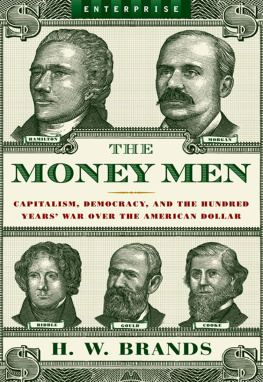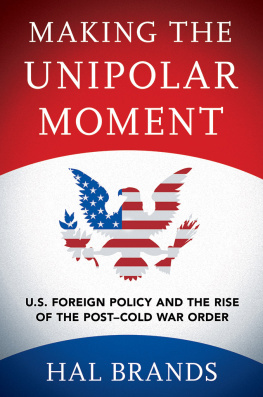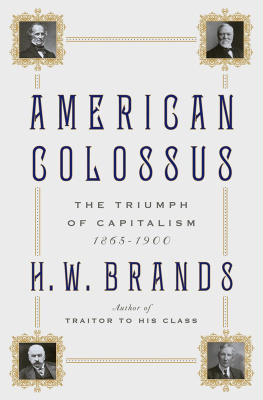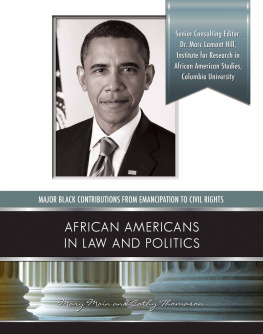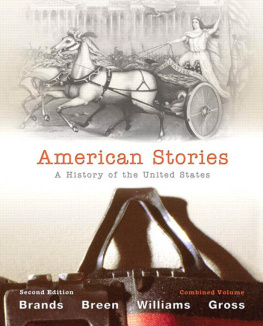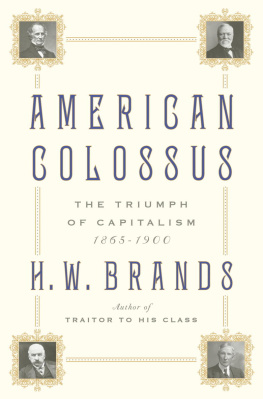The Money Men
Beneath the surface of business affairs lies the drama of human affairs. In the Atlas BooksW. W. Norton Enterprise series, distinguished writers tell the stories of the dynamic innovators and the compelling ideas that create new institutions, new ways of doing business and creating wealth, even new societies. Intended for both business professionals and the general reader, these are books whose insights come from the realm of business but inform the world we live in today.
PUBLISHED TITLES IN
THE ENTERPRISE SERIES
Ken Auletta
Media Man: Ted Turners Improbable Empire
Rich Cohen
The Record Men: Chess Records and the Birth of Rock & Roll
Tim Parks
Medici Money: Banking, Metaphysics, and Art in Fifteenth-Century Florence
George Gilder
The Silicon Eye: Microchip Swashbucklers and the Future of High-Tech Innovation
Stanley Bing
Rome, Inc.: The Rise and Fall of the First Multinational Corporation
James Buchan
The Authentic Adam Smith: His Life and Ideas
H. W. Brands
The Money Men: Capitalism, Democracy, and the Hundred Years War Over the American Dollar
FORTHCOMING TITLES
Richard Rayner
The Associates: Four Capitalists Who Created California
BY H. W. BRANDS
The Money Men: Capitalism, Democracy, and the Hundred Years War Over the American Dollar
Andrew Jackson: His Life and Times
Lone Star Nation: The Epic Story of the Battle for Texas Independence
Woodrow Wilson
The Age of Gold: The California Gold Rush and the New American Dream
The Strange Death of American Liberalism
The First American: The Life and Times of Benjamin Franklin
Masters of Enterprise: Giants of American Business from John Jacob Astor and J. P. Morgan to Bill Gates and Oprah Winfrey
What America Owes the World: The Struggle for the Soul of Foreign Policy
TR: The Last Romantic
The Reckless Decade: America in the 1890s
Since Vietnam: The United States in World Affairs, 19731995
The Wages of Globalism: Lyndon Johnson and the Limits of American Power
The United States in the World: A History of American Foreign Relations
Into the Labyrinth: The United States and the Middle East, 19451993
The Devil We Knew: Americans and the Cold War
Bound to Empire: The United States and the Philippines
Inside the Cold War: Loy Henderson and the Rise of the American Empire, 19181961
India and the United States: The Cold Peace
The Specter of Neutralism: The United States and the Emergence of the Third World, 19471960
Cold Warriors: Eisenhowers Generation and American Foreign Policy
ENTERPRISE
The Money Men
Capitalism, Democracy, and the Hundred Years War Over the American Dollar
H. W. Brands


W. W. Norton & Company
New York London
Copyright 2006 by H. W. Brands
All rights reserved
First published as a Norton 2007
For information about permission to reproduce selections from this book, write to Permissions, W. W. Norton & Company, Inc., 500 Fifth Avenue, New York, NY 10110
Library of Congress Cataloging-in-Publication Data
Brands, H. W.
The money men : capitalism, democracy, and the hundred years war over the American dollar / H.W. Brands. 1st ed.
p. cm. (Enterprise)
Atlas Books.
Includes bibliographical references.
ISBN: 978-0-393-34050-1
1. Capitalists and financiersUnited StatesHistory. 2. FinanceUnited StatesHistory. I. Title. II. Series: Enterprise (New York, N.Y.)
HG181.B82 2006
332.092'273dc22
2006009919
W. W. Norton & Company, Inc.
500 Fifth Avenue, New York, N.Y. 10110
www.wwnorton.com
W. W. Norton & Company Ltd.
Castle House, 75/76 Wells Street, London W1T 3QT
Contents
The Money Men
Prologue
The Money Question
F or the first five generations of Americas independent historyfrom 1776 till the eve of World War Ia single question vexed American politics and the American economy more persistently than any other. Political careers were made and broken on this question; political parties rose and fell. Great wealth rewarded those who answered it correctly; bankruptcy claimed those who got it wrong. No question touched more livelihoods and more lives more consistently, more intimately, more portentously.
The question was the money question. In simplest form it asked: What constitutes money in the United States? Gold? Silver? Paper currency? Bank notes? Checks? This central question raised subsidiary questions. How much money shall there be? Who ought to control it? To what ends?
The money question has been a puzzle for every society since the first ancient hit on the idea of employing proxiesseashells, shiny rocks, rare metalsfor value. But it was a particular conundrum for the United States during the eighteenth, nineteenth, and early twentieth centuries. This period encompassed the emergence of the two institutions that made modern America what it is today: democracy and capitalism. From the start an inherent tension existed between the two. The driving force of democracy is equality, of capitalism inequality. Democratic equality begins in the political sphere but bleeds into the economic realm; capitalist inequality arises in the marketplace but encroaches upon the public square.
The money question lay at the center of the contest between democracy and capitalism. The democrats demanded that the people control the money supply, to preserve and extend equality. Money was too important to everyday lives to be left to self-interested capitalists. The capitalists countered that managing money was a talent given to few, that even if the democrats were well-meaning (a dubious premise, in many capitalist minds), their inexpertise would doom their efforts and destabilize the economy. Besides, money was property, and property needed protecting from the masses.
Had the two groupsthe democrats and the capitalistsbeen distinct, their struggle over money would have been bitter and trying enough. But in America the two groups overlapped substantially. By the middle of the nineteenth century only the archest of capitalists could gainsay democracy, at least in theory. And most American democrats were capitalists themselves, prospective capitalists, or dependent on capitalists in one way or another. In his first inaugural address, after a brutal campaign fought over the money question, among others, Thomas Jefferson declared, We are all Federalists, we are all Republicans. Jeffersons listeners knew the Federalists as the party of emerging capitalism, the Republicans as the party of nascent democracy. And they might have extrapolated his dictum to the money question and concluded, correctly, that in a fundamental sense Americans were all capitalists and all democrats. But Americans had difficulty keeping their identities straight, with the result that policies and attitudes toward money careened wildly. Capitalism charted the course for a time, then democracy, then capitalism, then democracy.
The stormy seas of finance were no place for the faint of heart, but to the intrepid they offered unparalleled opportunities to serve the cause of democracy and the imperatives of capitalismsometimes separately, sometimes together. In every generation a few such bold spirits stood out, grappling with the question on which the fate of the American political economy hung. They were geniuses and rascals, statesmen and speculators, patriots and profiteers. They were the Money Men.

